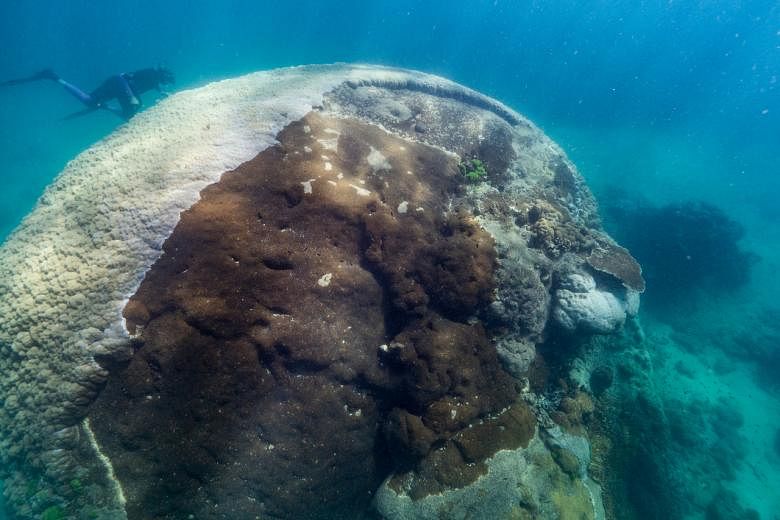SYDNEY - Several months ago, a group of snorkellers in the Great Barrier Reef in Australia spotted what appeared to be a huge boulder on the ocean floor.
The massive brown and cream-coloured object turned out to be a giant coral - a 10.4m-wide and 5.3m-tall creature that is one of the largest and oldest corals ever discovered in the reef.
The coral, which is 2.4m wider than any other measured in the reef, is believed to be between 421 and 438 years old. This means that it has survived multiple tropical cyclones and a series of recent bleaching events.
As concerns grow about the future of the Great Barrier Reef, scientists believe that studying such coral could provide vital insights into changes in the climate and ocean conditions.
The coral was found in March off the coast of Orpheus Island, about 250km south of Cairns, in Queensland. It was discovered by a group of citizen scientists.
A marine scientist, Dr Adam Smith, who was leading the group that made the discovery, said the size and age of the coral was "mind-blowing".
"We were having an explore and the water was very flat and we had heard there were some big corals in the area and we went to have a look," he told The Straits Times.
"We saw a big coral. It ended up being a massive coral. My first thought was that it was big and that it was beautiful."
The group measured the coral and then went back to the laboratory to compare the size with previous finds. They realised that their discovery was "very special" - the widest and the sixth-highest coral ever recorded in the reef. There was no sign of disease or bleaching.

A paper on the newly discovered coral, published in the journal Scientific Reports, concluded that the coral is "unusually rare and resilient". It said the coral had endured "almost 100 bleaching events and up to 80 major cyclones over a period of four centuries, plus declining nearshore water quality".
"Looking to the future there is real concern for corals in the (Great Barrier Reef) due to many impacts, including climate change, declining water quality, overfishing and coastal development," the paper said. "This field note provides important… information of a rare coral that can be monitored, appreciated, potentially restored and hopefully inspire future generations to care more for our reefs and culture."
The paper noted that there is currently no database of large, long-lived corals in Australia or internationally. It said such a catalogue could enable study of "coral skeletal cores which can help understand century-scale changes in oceanographic events and can be used to verify climate models".

The discovery comes amid growing concerns about the future of the Great Barrier Reef, a 2,300km reef system off Australia's east coast. The reef has suffered heavy loss of coral in recent years due to a series of bleaching events, warmer water temperatures, coastal development, agricultural and industrial pollution, outbreaks of crown-of-thorns starfish, and storms and other weather events.
Unesco recently considered downgrading the world heritage status of the reef due to the environmental damage. A committee last month decided to defer the decision until next year. A change of the reef's status to "in danger" could affect a lucrative tourism sector. Before the Covid-19 pandemic, the reef attracted millions of tourists each year and supported some 70,000 jobs.
Dr Smith said that the reef had lost about 50 per cent of its coral cover in the past 30 years, making the recent discovery of the Orpheus Island coral a welcome change from recent "stories of doom and gloom".
"This coral has obviously survived 400-plus years of potential impacts, from bleaching to cyclones," he said.
"It has either been lucky or resilient. It is big and healthy. It's a beacon of hope."



